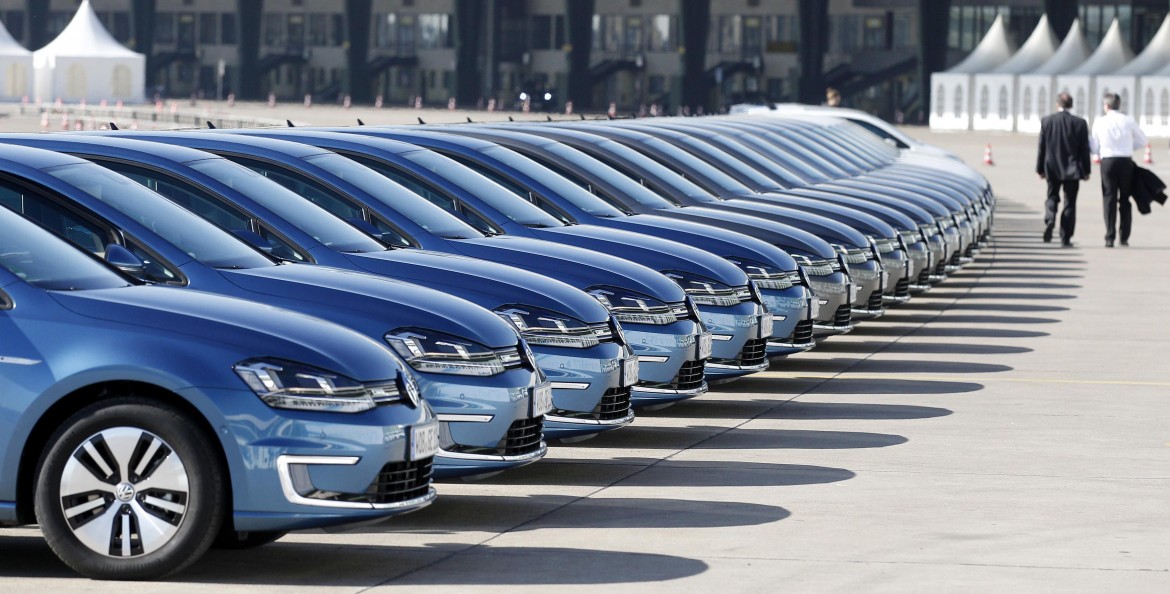Analysis
Volkswagen’s pivot to electric
The ‘E-wagen’ is the only way for Germany’s flagship industry to expiate its sins exposed by ‘Dieselgate,’ overcoming the scandal of emissions tests conducted on human guinea pigs.

The electric revolution has come to “the people’s car.” Within four years, 16 Volkswagen Group factories around the world will be dedicated entirely to the production of zero-emission vehicles. This is a development of massive importance, both for the environment, for mass mobility, and for the market in this sector, boosted by an investment of €90 billion. The goal of the largest European car manufacturer (which conducts a full fifth of its operations in Lower Saxony) is to sell three million electric “E-wagen” per year by 2025, winning the trade war against a United States led by a protectionist Trump and against the Japanese-Korean competition.
This billion-dollar business venture, blessed by the fourth Merkel government, by a company which is still under EU sanctions for excessive pollution, is, in the end, the only way for Germany’s flagship industry to expiate its sins exposed by “Dieselgate,” overcome the scandal of emissions tests conducted on human guinea pigs, and move past the landmark court ruling affirming that “diesel kills,” issued on Feb. 28 by the Federal Court in Leipzig. “Over the last few months, we have pulled out all the stops to implement ‘Roadmap E’ [Volkswagen’s electric vehicle plan] with the necessary speed and determination,” said Matthias Müller, CEO of the Wolfsburg-based group, on the sidelines of the conference presenting the company’s proposed budget.
There is a plan on his desk to multiply the capacity of the current electric production facilities tenfold, with the setup of a dedicated battery branch. All this comes as a consequence of an industrial revolution which coincides to a large extent with a geopolitical reaction. From today until 2022, VW has contracts worth €20 billion with suppliers both European and (especially) Chinese, while the company has not yet made a decision on the purchase of American technology and its choice of partners for the US market.
It is all part of the commercial tug of war between Berlin and Washington, whose bilateral relations are at a record low. But it is also a sign that the competition with which the historical car brands are contending no longer comes from the automotive industry itself, but from Silicon Valley, in particular Elon Musk’s Tesla.
On the table are €12 billion for free public transport in five German cities, set aside by the Environment Ministry led by the SPD: a large-scale order of electric buses for the benefit of German industry, which was caught unprepared by its announcement just a month ago. This has led to the great turn by Wolkswagen, which is updating its assembly lines for producing 80 new battery-powered models, for what will be the largest fleet of electric vehicles in the world. The Otto model, with a hybrid engine, is already available for order through dealers in Berlin; by the end of the year it will be joined by 10 more models, a third of which will be fully zero-emissions vehicles.
This revolution will involve all 12 trademarks held by the Wolfsburg group, from Audi to Skoda. According to Müller, Volkswagen’s electric vehicle plans will also lead to a massive change when it comes to marketing: starting from 2019, they will present a new car “virtually every month,” he predicts, highlighting his strategy to take over the sector. At the same time, though, “traditional” engine vehicles, including those based on the now infamous diesel fuel, will not be abandoned before exhausting the current stocks and the ongoing sales and marketing projects.
According to the head of WV, modern diesel engines are “a part of the solution,” not the problem. “We are making massive investments in the mobility of tomorrow, but without neglecting current technologies and vehicles that will continue to play an important role for decades to come,” clarified Müller, trying to avoid any misunderstandings. However, the revolution announced Thursday is confirmed by the figures in the VW budget for the next five years, with €90 billion earmarked for establishing their presence in the electric vehicle sector, no longer restricted to the specialized niche represented by the “Sedric” prototype or the “Streetmate” and “Cityskate” scooters they presented at the Geneva Motor Show.
Going beyond what this means for the electric vehicle sector, it is important to underline that VW is a company that invests enormous sums in research and development in Europe, on the scale of a full-fledged nation-state. The confirmation of the November 2019 launch of the first electric model (codenamed “Id”) comes with the certainty that the prototype will already come out of the factory in two weeks, ready for 16 months of road testing. Everything has been set in motion to realize the plan that will transform the current number of two million electric cars circulating worldwide to the 140 million expected by 2030 (by the estimates of the International Energy Agency), and which will increase the size of the battery market by an estimated $75 billion over the next six years.
This is in fact a part of the problem, as Müller himself admits, because the issue of the disposal of lithium batteries remains the negative flipside of the rise of the electric car. The current capacity to reprocess rechargeable batteries is limited to one mega-plant operating in Belgium, while the collection of spent batteries is done by centers managed by thousands of micro-enterprises. This is simply too little for current needs, as the waste products from the first “clean” cars sold in 2012 are starting to arrive in Italian landfills.
Originally published at https://ilmanifesto.it/la-svolta-elettrica-di-volkswagen/ on 2018-03-16
